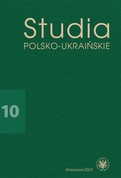Живе повсякдення давнини: перше видання діаріуша Пилипа Орлика 1725 і 1726 рр.
Everyday Life of Ancient Times: The First Edition of Pylyp Orlyk’s Diary of 1725 and 1726
Author(s): Olha NovykSubject(s): Archiving, Political history, Ukrainian Literature, 18th Century
Published by: Wydział Lingwistyki Stosowanej Uniwersytetu Warszawskiego
Keywords: Pylyp Orlyk; manuscript; archive; first edition;
Summary/Abstract: Walentyna Sobol’s new book is timed to a double date: the 350th birth anniversary and the 280th death anniversary of the famous personality: the poet, writer, and hetman of Ukraine Pylyp Orlyk (1672–1742). Walentyna Sobol analysed all the most important academic literature on Pylyp Orlyk’s work, and carried out thorough research, read out the manuscript text of the Diary of 1725 and 1726. Her many years of work on the manuscript and its publication took place in several stages. First, an abridged copy of Diary, made in 1830 by anonymous palaeographers, was read. Then the diary manuscript of 1724 was read. In the course of the next stage, in 2012, the researcher got hold of the original manuscript of Orlyk’ Diary, which is kept in the Diplomatic Archives of the Ministry of Foreign Aff airs of France. Walentyna Sobol compared the facsimile edition with the original and found fragments of the manuscript missing from the facsimile. The researcher concludes that Orlyk’s text shows a combination of the education received by the hetman in Vilnius and finalised in Kyiv with European influences. Th is is confirmed by both the content of the notes and their form. Baroque features of notes, and Latin-Polish macaronisms are not just a tribute to fashion but also evidence of belonging to a specific literary tradition because, in the manuscripts of letters and diaries of many pupils of the Kyiv-Mohyla Academy, we see similar linguistic features. The first edition of Orlyk’s diary from 1725 and 1726 is an inexhaustible source of information for researchers in various fields, such as historians of religion, palaeographers, cultural anthropologists, linguists studying the languages spoken in the first half of the eighteenth century – Latin, Old Church Slavonic, Old Polish, Old French – their importance in the activities of European political elites.
Journal: Studia Polsko-Ukraińskie
- Issue Year: 2023
- Issue No: 10
- Page Range: 217-223
- Page Count: 7
- Language: Ukrainian

